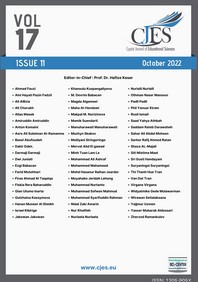Does faculty well-being mediate the relationship between HR practices and quality education? Evidence from developing context
Does faculty well-being mediate the relationship between HR practices and quality education? Evidence from developing context
Author(s): Jakowan Jakowan, Mohd Hasanur Raihan Joarder, Mohammad Ali Ashraf, Sarker Rafij Ahmed RatanSubject(s): Higher Education , Socio-Economic Research, Sociology of Education, Pedagogy
Published by: Birlesik Dunya Yenilik Arastirma ve Yayincilik Merkezi
Keywords: Compensation; faculty well-being; job autonomy; promotion opportunity; quality education;
Summary/Abstract: The purpose of this study is to examine the relationship between sustained general well-being and quality education experienced by faculty members in private universities. Particularly, how do managerial practices, such as faculty compensation, job security, job autonomy and faculty promotion opportunity, affect quality education mediated by faculty well-being? To answer this question, a theoretical framework using the effort–reward imbalance (ERI) model as its basis was established. Using measurement scales, a survey instrument was developed to test the various relationships implied by the ERI model. Data (n = 515) were collected from faculty members of private universities in Bangladesh in 2019. Structural equation modelling was followed to analyse the data. The findings of the study indicate that faculty well-being has a significant direct and mediating role to influence quality education in private universities in Bangladesh.
Journal: Kıbrıslı Eğitim Bilimleri Dergisi
- Issue Year: 17/2022
- Issue No: 11
- Page Range: 4074-4091
- Page Count: 18
- Language: English

